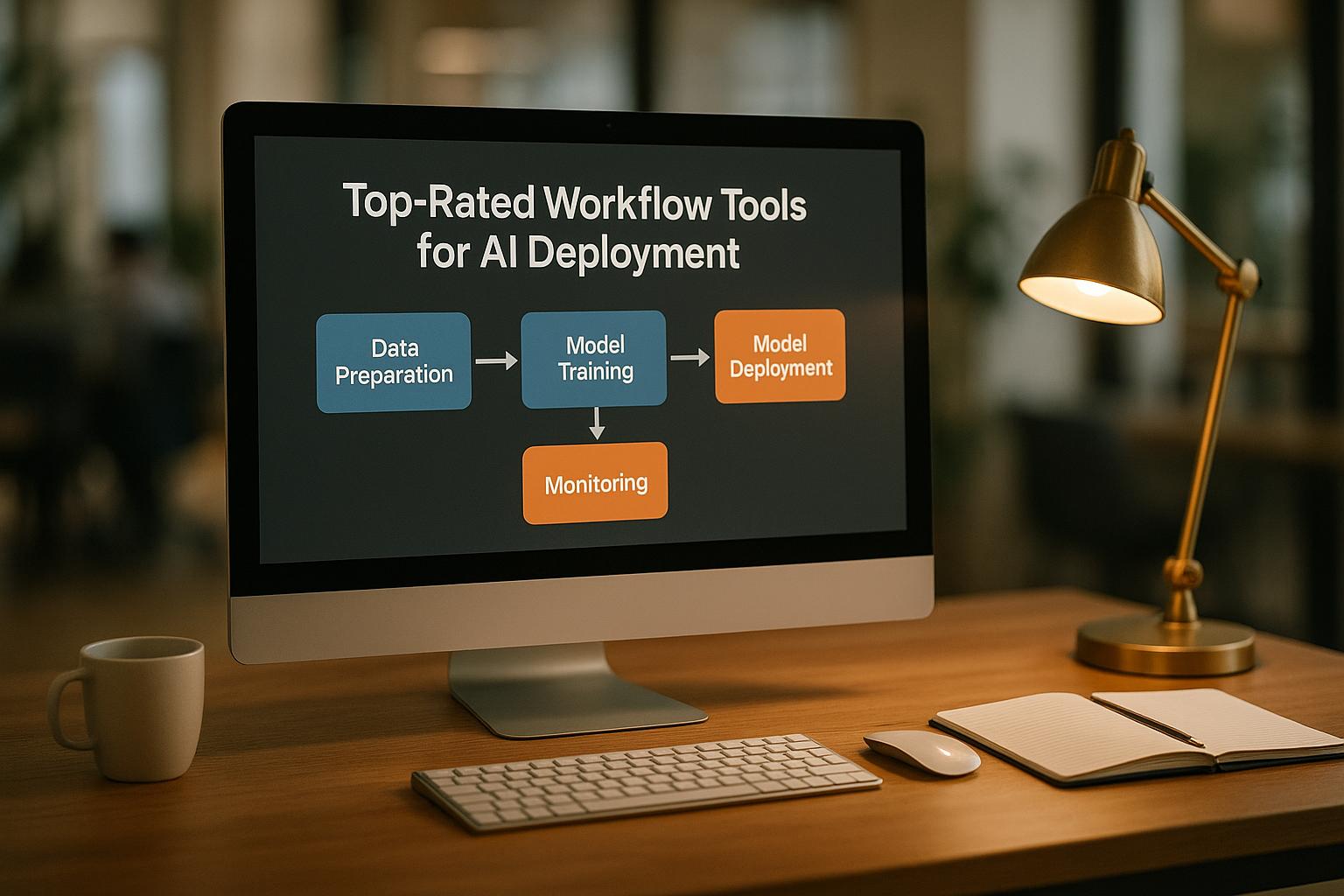
AI deployment can be challenging for enterprises, but the right tools simplify workflows, control costs, and ensure compliance. This article highlights six leading platforms to help businesses scale AI efficiently:
These platforms address key enterprise needs: compatibility, cost control, and governance. Whether you're managing AI budgets or scaling across departments, these tools streamline processes while maintaining security and compliance.

Prompts.ai brings together over 35 of the world’s top AI models - including GPT-5, Claude, LLaMA, and Gemini - into a single, secure platform. By consolidating these tools, it eliminates the complexity of managing multiple systems, making large-scale AI deployment both simpler and more cost-efficient.
"Unify your AI tools in One Secure, Enterprise‐ready Platform" - Prompts.ai
Prompts.ai ensures smooth connectivity with its built-in connectors and APIs, integrating AI models with popular business tools like Slack, Gmail, and Trello. This allows businesses to create unified workflows while also enabling side-by-side comparisons of large language models (LLMs). With this feature, users can fine-tune performance and control costs more effectively.
One of Prompts.ai’s standout features is its real-time cost management system. Through intuitive dashboards and analytics, organizations can monitor AI usage, compute expenses, and allocate resources efficiently. Tools like budget thresholds, overrun alerts, and detailed financial reports - designed to align with U.S. standards - help businesses maintain financial control.
Prompts.ai also introduces the TOKN pooling system, a shared credit management tool that transforms fixed costs into flexible, on-demand resources. This system empowers teams to maximize efficiency while keeping budgets in check.
"Replace more than 35 disconnected AI tools and reduce costs by 95% in less than 10 minutes" - Prompts.ai
All of these financial tools integrate seamlessly into Prompts.ai’s governance framework, creating a streamlined experience.
Prompts.ai is designed with robust governance features that meet strict compliance requirements, including SOC 2 and HIPAA standards. It offers role-based access, audit trails, data encryption, policy management, and automated compliance checks. The Trust Center (trust.prompts.ai) provides real-time security insights, ensuring transparency and accountability.
"We are actively engaged with Vanta for continuous control monitoring and have activated our SOC 2 Type 2 audit process on June 19, 2025" - Prompts.ai
These governance and compliance tools allow both large enterprises and smaller organizations to scale their AI operations while maintaining rigorous security and regulatory standards.
Prompts.ai’s modular design supports a range of deployment options, including cloud, hybrid, and on-premises setups, making it adaptable to various industries. For instance, a U.S. healthcare provider integrated natural language processing (NLP) models with their electronic health record (EHR) system to automate patient intake. This solution ensured secure data handling, real-time cost tracking, and HIPAA compliance.
This flexibility makes Prompts.ai a valuable tool for industries like healthcare, finance, retail, and manufacturing, enabling them to scale AI solutions to meet their specific needs.
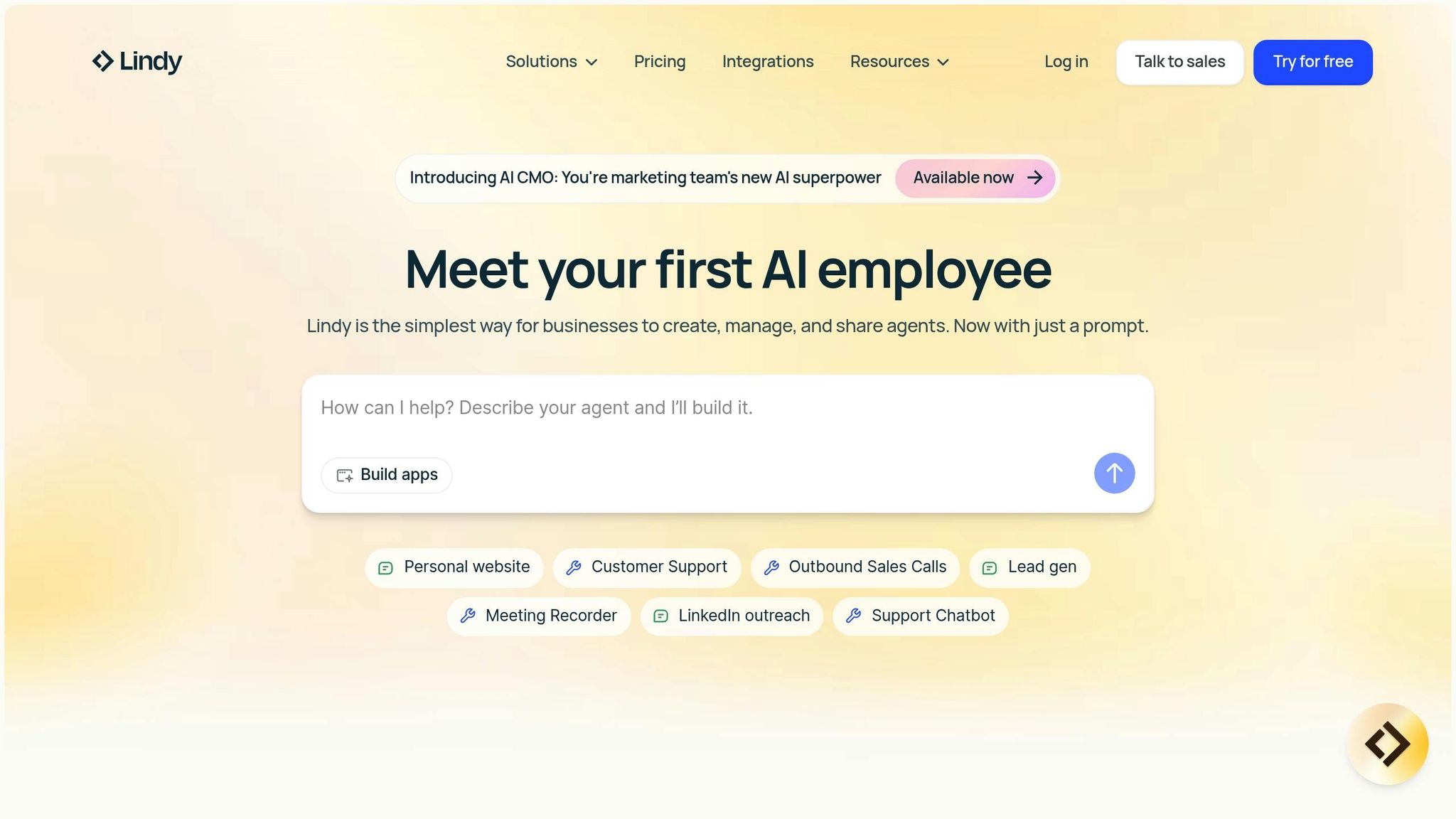
Lindy.ai provides a model-agnostic platform designed to streamline AI workflow automation. This approach allows organizations to choose the most suitable AI models for their automated agents, ensuring flexibility and seamless integration.
Lindy.ai stands out with its extensive library of integrations, enabling users to connect with a wide range of existing applications and systems. By integrating with your current tech stack, the platform makes it easy to create and deploy custom automations tailored to your needs.
One of Lindy.ai's standout features is its ability to continuously pull data from widely used platforms like Google Drive and Notion. This ensures its AI agents always have access to the latest information, maintaining a dynamic and up-to-date knowledge base. Additionally, the platform supports multi-account connections, making it possible to link several accounts from the same provider for added flexibility.
The "Browse all integrations" option highlights Lindy.ai's dedication to connectivity, making it a powerful tool for simplifying and scaling AI operations across diverse workflows.
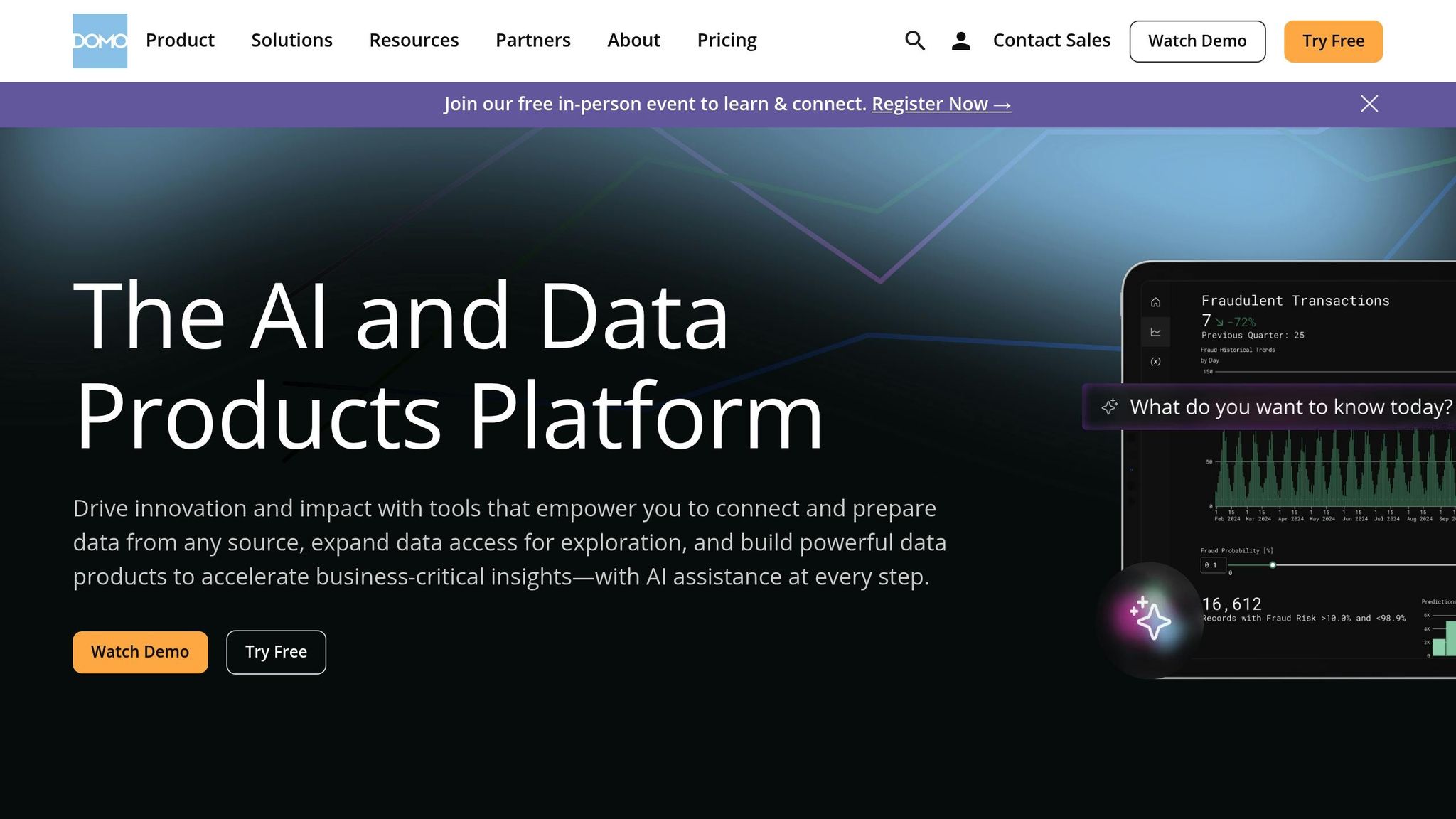
Domo is a cloud-based business intelligence (BI) platform that excels in managing and visualizing data from multiple sources. While its primary reputation lies in data integration and analytics, it also plays a key role in supporting AI initiatives, making it a versatile tool for organizations.
Domo simplifies data aggregation with its extensive library of pre-built connectors, enabling seamless integration from various cloud platforms, databases, and services. The platform’s DataSet API ensures that dashboards and reports are automatically updated, keeping insights fresh and relevant. For quick and efficient data preparation, Domo offers Magic ETL, a no-code tool that transforms raw data into actionable formats, streamlining the analysis process.
Built with enterprise needs in mind, Domo provides advanced security features, including role-based access controls and SAML single sign-on, ensuring data is accessible only to authorized users. Data security is further reinforced with comprehensive encryption, both at rest and during transit, alongside detailed logging for full transparency. These features not only safeguard sensitive information but also help organizations meet strict compliance requirements.
Domo’s secure and flexible framework allows it to scale effortlessly, accommodating businesses of all sizes. With customizable dashboards and ready-made industry templates, the platform enables precise and efficient data analysis tailored to the unique needs of any AI-driven project. Whether for small teams or large enterprises, Domo adapts to deliver impactful insights.
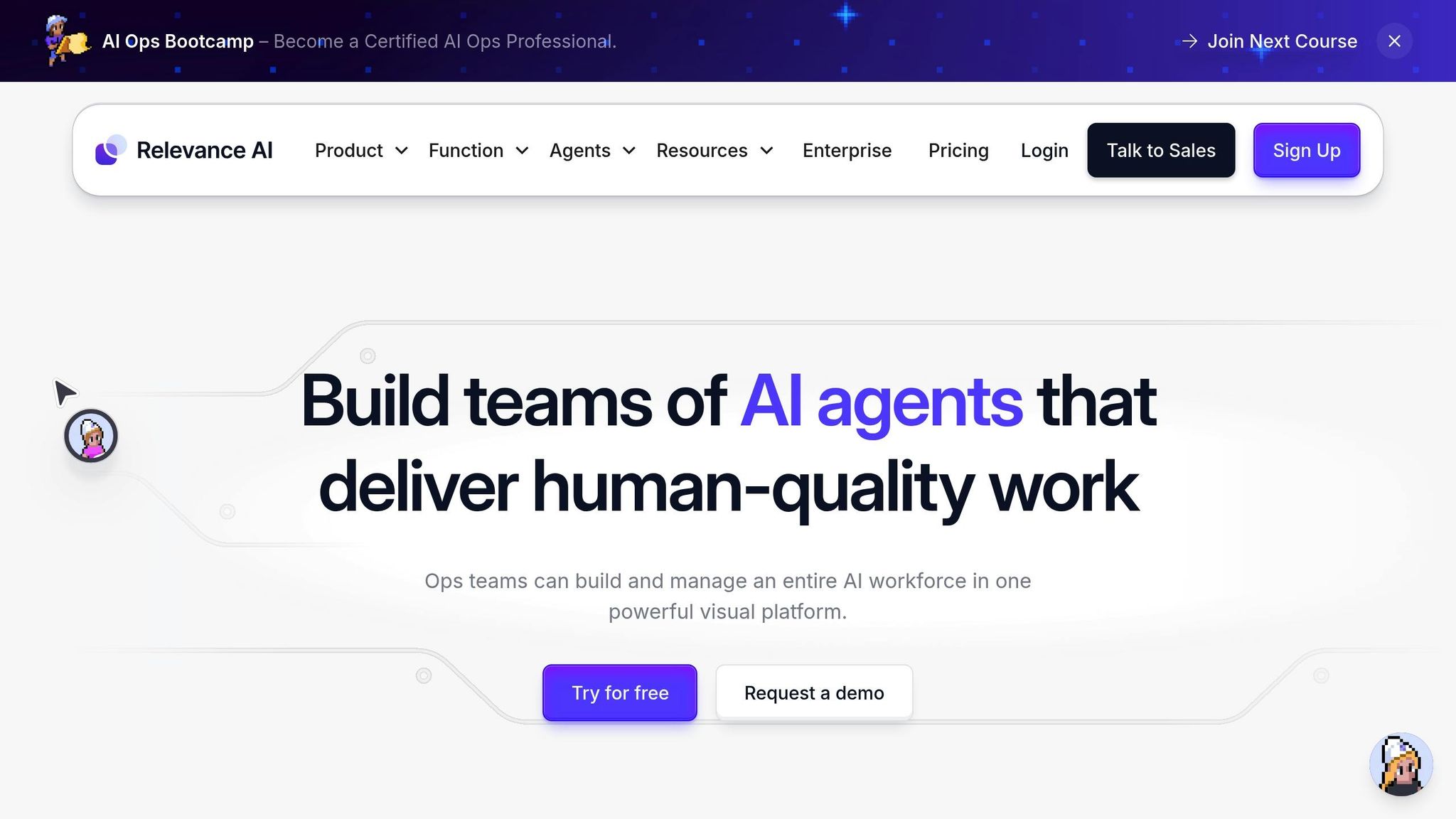
Relevance AI is a platform designed to streamline AI cost management by leveraging its Cost Allocation Optimization AI Agents. These agents automate essential cost allocation tasks, applying machine learning and analytics to fine-tune costs in real time. By reducing bias and freeing up employees to focus on strategic priorities, the platform enhances both efficiency and decision-making capabilities. Building on features from earlier workflow systems, Relevance AI emphasizes financial optimization and simplified governance.
The platform excels in real-time financial analysis, using AI agents to continuously refine cost allocations. By combining historical data with current trends, it provides predictive insights that help organizations stay ahead of potential challenges. Its automated cost attribution system intelligently assigns expenses to projects, products, or departments based on intricate rules and actual usage patterns, ensuring accuracy and fairness.
Relevance AI includes robust governance features, such as anomaly detection, which flags irregular spending or cost allocation for further review. It also aggregates cost data from multiple sources - like ERP systems, project management tools, and time-tracking software - into one unified dashboard. This centralized view simplifies audits and reporting, making compliance processes more efficient.
The platform offers dynamic budget adjustments and scenario modeling, allowing organizations to explore optimal cost allocation strategies under various conditions. Additionally, its cost driver analysis identifies the key factors influencing expenses across departments or business units.
To support decision-making, Relevance AI generates tailored reports and actionable recommendations. These insights cater to both technical teams and executives, ensuring everyone has the information they need to make informed financial decisions based on AI-driven spending analysis.
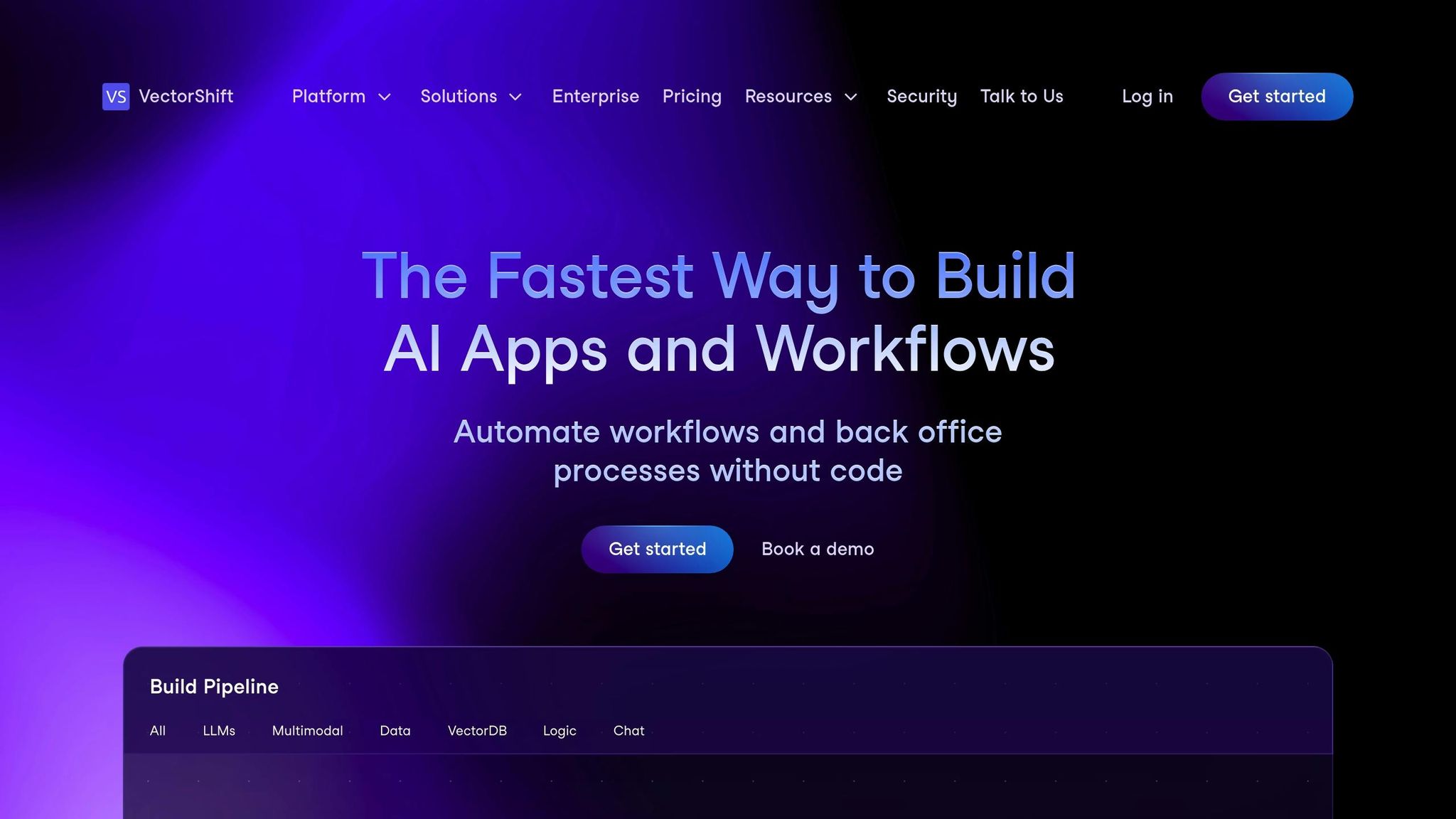
VectorShift offers a no-code platform designed to simplify AI deployment using visual workflow tools and automated pipeline management. By combining an easy-to-use interface with powerful automation and integration features, it helps businesses streamline their AI processes efficiently.
At the heart of VectorShift is its user-friendly visual interface, which enables users to design complex AI workflows without any coding skills. With its drag-and-drop builder, you can seamlessly connect AI models, data sources, and business applications into automated pipelines. These workflows can be set to trigger automatically under specific conditions, run on schedules, or manage multi-step processes across teams and departments.
Real-time monitoring tools provide detailed execution logs, allowing teams to track performance and quickly address bottlenecks. This visual-first approach significantly cuts deployment time, turning projects that once took weeks into tasks completed in just hours - all while maintaining enterprise-grade reliability.
VectorShift integrates effortlessly with leading enterprise tools like Salesforce, HubSpot, Microsoft Office 365, and custom databases via REST APIs. Its data connectors ensure workflows operate on the most up-to-date information by syncing data across systems automatically.
The platform also features advanced data transformation tools, enabling users to clean, organize, and prepare data for AI applications without requiring technical expertise. Whether dealing with structured or unstructured data, VectorShift adapts to a wide range of needs, from automating customer service tasks to generating financial reports.
Offering deployment options in the cloud, on-premises, or hybrid configurations, VectorShift accommodates organizations with specific security or compliance needs. The platform dynamically adjusts computing resources to match workflow demands, balancing performance with cost efficiency.
For enterprise clients, VectorShift provides dedicated support, custom integrations, and white-label deployment options. Its modular design makes it easy to start small with a single use case and expand across departments as AI adoption grows within the organization.
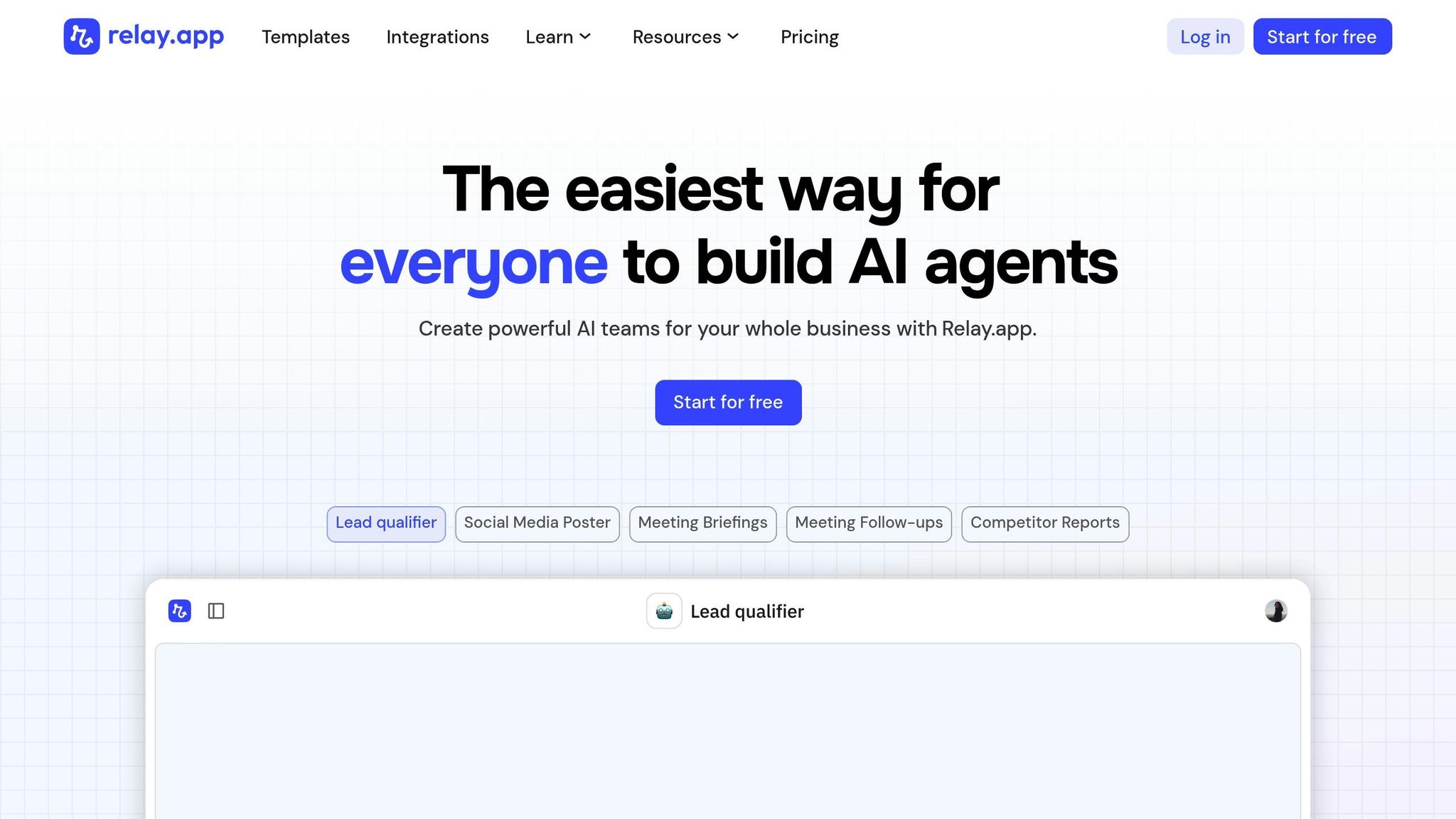
Relay.app brings AI into the heart of business operations by combining powerful automation tools with built-in AI capabilities and extensive third-party integrations. It simplifies AI deployment, making it an excellent choice for organizations aiming to implement AI-driven workflows across various departments and applications.
Relay.app stands out for its seamless integration with AI models, offering built-in AI steps for tasks like content summarization, translation, and data extraction. With support for custom AI prompts, businesses can automate even the most complex workflows by tailoring AI instructions to their specific needs.
The platform connects with over 100 tools, including popular AI frameworks like OpenAI, ensuring smooth data exchange between systems. These integrations are designed to work effortlessly, forming the foundation of Relay.app's advanced interoperability with AI models.
"Used gpt in the workflow to parse the replies to our waitlist email qtns & saved them into our notion database." - Lucas Grey, @ImLucasGrey
Unlike many tools that force businesses to adapt their workflows, Relay.app aligns with existing processes, reducing the time and effort needed for implementation.
Relay.app’s integration capabilities naturally extend to enterprise-level scalability and oversight. The platform enables businesses to scale workflows with features like advanced iteration, human checkpoints, and flexible deployment options. These tools are vital for building sophisticated AI workflows that can handle complex, enterprise-level demands.
One of the standout features is its human-in-the-loop functionality, which adds checkpoints for tasks like approvals and data entry. This ensures compliance and control, making it particularly suited for critical workflows that require human oversight alongside automation.
Relay.app positions itself as a solution to "Empower your entire business with AI-driven teams", highlighting its readiness to support organization-wide AI initiatives. Its modular design allows companies to start small, focusing on specific use cases, and gradually expand their AI automation as they gain experience and confidence.
The platform’s integration ecosystem is compatible with diverse tech stacks and existing business systems, enabling organizations to enhance their current infrastructure with AI capabilities without the need for major overhauls.
The table below provides a snapshot of Prompts.ai's standout features, pricing model, and scalability options.
| Platform | Starting Price (USD) | Key AI Integrations | Scalability Features | Compliance & Security | Best For |
|---|---|---|---|---|---|
| Prompts.ai | $0/month (Pay-as-you-go) | 35+ LLMs including GPT‑5, Claude, LLaMA, and Gemini | Enterprise-grade orchestration; real-time FinOps cost controls | Enterprise governance; audit trails | Organizations reducing AI tool sprawl |
Prompts.ai's strengths extend beyond this table - its pricing flexibility, integration depth, and scalability make it a powerful solution for enterprise AI needs.
Pricing Flexibility
Prompts.ai operates on a pay‑as‑you‑go model using its proprietary TOKN credit system. This approach eliminates fixed monthly fees, allowing costs to scale with usage. It's particularly beneficial for businesses with unpredictable or seasonal AI workloads.
Seamless Integration for Enterprises
With access to over 35 leading AI models through a secure platform, Prompts.ai simplifies operations by consolidating tools into one interface. Its TOKN credit system, paired with strong governance measures, ensures cost management and compliance at an enterprise level.
Scalability and Performance
Prompts.ai's orchestration platform is designed for large-scale AI operations. It allows teams to manage multiple models effortlessly and provides side‑by‑side comparisons to help choose the best model for specific tasks, ensuring efficient and data-driven decisions.
These features make Prompts.ai an excellent choice for businesses looking to streamline their AI workflows and reduce tool redundancy.
Choosing the right workflow tool can redefine how AI is deployed by bringing systems together, managing costs effectively, and maintaining compliance. The platforms discussed here deliver clear benefits in interoperability, cost management, and security compliance - all vital for achieving success with AI.
Interoperability takes center stage by simplifying operations. These unified tools bring multiple AI models into a single, cohesive interface, cutting through the confusion that often hinders AI projects. This streamlined approach is invaluable for organizations of any size.
Cost management becomes straightforward with transparent pricing and real-time tracking. Pay-as-you-go models ensure expenses align with actual usage, making them especially useful for businesses with variable AI demands.
Compliance and security features meet rigorous governance requirements while safeguarding sensitive data, ensuring organizations maintain high standards of protection.
When selecting a platform, consider your team size and growth trajectory. Small teams can benefit from affordable, easy-to-implement solutions. Mid-size businesses should look for platforms that scale seamlessly with increased AI activity. Large enterprises require advanced governance tools, wide-ranging model access, and features that support managing multiple teams efficiently.
Prioritize platforms that eliminate tool overload, provide transparent cost tracking, and meet your industry’s security needs. Streamlined workflows, predictable costs, and strong governance pave the way for scalable AI success. The decision you make today will shape your AI journey for years to come.
AI deployment tools are built to help businesses cut costs by simplifying workflows and eliminating inefficiencies. They allow companies to allocate resources wisely, such as using smaller AI models that maintain strong performance while keeping expenses in check. These tools also enable cost-saving approaches like virtualization and containerization, which enhance system efficiency.
Another way to lower costs is by self-hosting AI solutions or leveraging embedded AI, both of which can be more budget-friendly alternatives to relying entirely on cloud-based tools. Deploying AI strategically across CPUs and accelerators ensures that expensive resources are used only when absolutely necessary. These methods allow businesses to save money while maintaining high performance standards.
When selecting AI workflow tools, focus on features that enhance oversight and meet compliance standards. Prioritize tools with AI model inventory and classification capabilities to automatically identify and categorize models based on their risk levels and sensitivity. Real-time usage monitoring is another must-have, enabling you to track activity across various platforms effectively.
Ensure the tools you choose align with regulatory requirements such as the NIST AI RMF or EU AI Act. Look for those offering automated risk assessments to evaluate aspects like bias, fairness, and security. Features such as policy enforcement for secure operations, audit-ready documentation, and smooth integration with your existing systems are also critical. Lastly, opt for solutions equipped with built-in bias detection and explainability to maintain transparency and fairness in AI processes.
To choose the right AI deployment platform for your industry, begin by pinpointing your main objectives - whether it's automating decision-making, integrating complex data, or expanding operations efficiently. Look for platforms that simplify workflow management and excel in AI orchestration to meet these goals.
Key considerations include how easily the platform integrates with your current systems, its ability to scale as your needs grow, and its support for use cases specific to your industry. Focusing on these aspects will make your AI deployment smoother and ensure it delivers results aligned with your business priorities.


